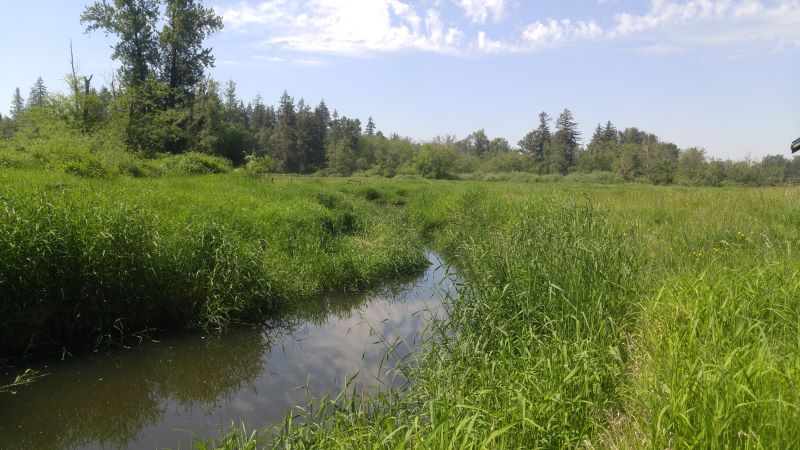Stewarding Agricultural Watercourses (SAW)
The Stewarding Agricultural Watercourses (SAW) project, aims to identify key challenges and opportunities for agricultural producers undertaking watercourse stewardship on private land and enable the province to build on current programs, guidelines and tools to further advance and support this important work.

Over a period of decades, the Province has worked with producers, non-governmental organizations, industry organizations, and other government agencies to enhance stewardship of riparian areas threaded throughout private agricultural land. The Environmental Farm Plan (EFP) and Beneficial Management Practices (BMP) programs have provided information resources and funding support for producers to maintain and enhance riparian areas through practices such as improved stream crossings, alternative watering sources, exclusion fencing, and re-vegetation. Building on the work undertaken by the Province and the farming community, the SAW project aims to increase the adoption of beneficial riparian management practices and increase participation in programs that support riparian stewardship.
The SAW project has unfolded in two phases. The first phase (2021-2023) was focused on information gathering and engagement to better understand how farmers and ranchers are managing riparian areas and watercourses on agricultural land. This work resulted in a What We Heard document, Discussion Paper and Action Plan.
Phase two of the project will focus on advancing the priorities identified in the Phase one Action Plan.
What we heard
During the engagement process, participants shared concerns and ideas for change.
A What We Heard document was developed to provide a summary of engagement results from an online survey and interviews conducted by phone and zoom.
There were five key objectives associated with the engagement activities:
- Learn about barriers and challenges experienced by agricultural landowners and leaseholders in stewarding watercourses and riparian areas on farmland
- Identify opportunities to address some of the concerns raised by agricultural landowners and leaseholders
- Address the barriers to watercourse stewardship on agricultural land, laying out steps to short, medium and long-term implementation
- Enhance collaboration between Indigenous communities, agricultural groups, and various levels of government
- Enhance understanding of current stewardship of watercourses on agricultural land and ensure farmers and ranchers have a better comprehension of expectations around watercourses.
A survey was launched online to gather insights and experiences from producers on watercourse management. The survey was advertised through existing networks, including industry associations, and was open from May 24 to July 4, 2022, online through Survey Monkey. A total of 235 responses were received.
In addition to the survey, approximately 30 one-on-one interviews were conducted with a variety of stakeholders to further understand the challenges and develop some potential solutions. Finally, three focus groups were facilitated to circulate an early draft of the Discussion Paper for feedback. The three focus groups were organized by audience type:
- Practitioners (8 participants)
- Local government staff (21 participants)
- Provincial government staff (11 participants)
The input received during these sessions was instrumental in fine-tuning the potential actions and determining the list of collaborators for each action.
Discussion paper
Following the finalization of the What We Heard Document, a Discussion Paper was produced in March 2023 to provide initial recommendations for actions that AF could undertake during the Phase 2 implementation of the SAW Project. These recommendations are rooted in core concepts and themes that arose during the initial project engagement phase and are designed to be actionable and measurable.
The Discussion Paper identifies recommended actions across four key themes which are:
- Coordinate watercourse stewardship at a watershed level
- Create opportunities for communication and outreach
- Collaborate to improve permits, notifications, and authorization processes
- Connect produces with funding for watercourse stewardship
These actions and themes informed the development of the Action Plan.
Action plan
The SAW Phase 1 Action Plan was informed by content and feedback received through the SAW engagement process and was completed in September 2024. The SAW Action Plan lays out 23 distinct actions organized under the four key themes identified in the Discussion Paper. The actions collectively provide strategic direction for AF to best improve and support farmers' and ranchers’ ability to steward watercourses on their properties.
The Action Plan consists of short-, medium-, and long-term actions with implementation timeframes ranging from up to 2 years to more than 5 years. Some actions, including collaboration with the Ministry of Water, Lands and Resource Stewardship (WLRS) to address concerns with water authorization processes, are already underway.
